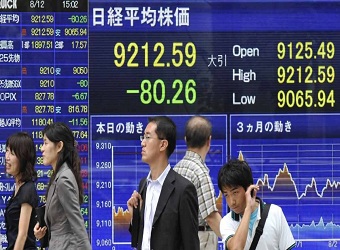Asian markets were mixed on Thursday, as some regional stock indexes shrugged off early losses despite concerns over heightened trade tensions.
The Nikkei 225 edged up by 0.16 percent, reversing losses seen earlier in the day. The broader Topix traded higher by 0.05 percent.
Despite the broader gains, shippers declined with the Topix sea transport index lower by 1.76 percent. Meanwhile, automakers and technology names traded mixed.
Across the Korean Strait, the Kospi added 0.13 percent.
Hong Kong’s Hang Seng Index advanced 0.12 percent. The financials subindex eked out gains on the whole, even though heavyweights HSBC and AIA were down 0.33 percent and 0.37 percent, respectively. The energy sector fell 1.13 percent, underperforming the benchmark.
Mainland markets crept slightly lower. The Shanghai composite was off by 0.04 percent and the Shenzhen composite slipped 0.49 percent.
Newly listed stocks on the mainland traded lower, with names like China Express Airlines down 9.35 percent. The dive in share prices came after a Xinhua report cited regulators saying such stocks were vulnerable to near-term speculation, Reuters said. In Sydney, the S&P/ASX 200 shed 0.18 percent as losses in the heavily weighted financials subindex, which traded lower by 0.84 percent, weighed on the broader index.
In Sydney, the S&P/ASX 200 shed 0.18 percent as losses in the heavily weighted financials subindex, which traded lower by 0.84 percent, weighed on the broader index.
Major U.S. stock indexes all recorded declines in the last session as markets digested trade-related developments out of Washington, with the Dow Jones industrial average falling 1 percent, or 248.91 points, to close at 24,758.12.
Shares of Boeing fell 2.5 percent following news of potential trade measures, which could include investment restrictions and indefinite tariffs, being considered against China by President Donald Trump.
Trump could implement tariffs on $60 billion worth of Chinese goods, according to Reuters.
The White House on Wednesday also said the Trump administration wanted China to reduce its trade surplus with the U.S. by $100 billion, and not the $1 billion figure Trump had tweeted last week.
Asian stock indexes had closed lower in the last session amid talk of potential additional U.S. tariffs. That overshadowed the release of better-than-expected industrial output and fixed-asset investment data out of China.
The looming possibility of a trade war saw bond yields dip. The yield on the 10-year U.S. Treasury note stood at 2.8061 percent at 12:52 p.m. HK/SIN, below the 2.81 percent seen on Wednesday. Yields trade inversely to bond prices.
In currencies, the dollar index, which tracks the greenback against a basket of rival currencies, stood at 89.650 at 12:37 p.m. HK/SIN.
Larry Kudlow, the Trump administration’s newly tapped top economic advisor, on Wednesday told CNBC that a “a great country need[ed] a strong currency.”
Those remarks, however, were unlikely to lift the dollar much given how concerns over the possibility of a trade war continued to simmer in the background, wrote Mizuho Bank economist Zhu Huani in a note.
Against the yen, the dollar extended losses to 105.98 amid trade-related worries, below the 106.2 handle seen in the last session.
In individual stocks, Cathay Pacific jumped 4.79 percent after the airline on Wednesday announced a loss of 1.26 billion Hong Kong dollars ($160 million) in 2017 — smaller than the HK$2.15 billion forecast in a Reuters poll.
In corporate news, Samsung Electronics said it would start constructing a memory chip production line in China at the end of the month in a bid to enhance its NAND flash technology, Reuters reported. Samsung shares were off by 0.27 percent.
Oil prices held onto overnight gains after data on Wednesday showed U.S. crude inventories rose more than expected, while gasoline inventories dropped more than forecast. U.S. crude futures edged up 0.13 percent to trade at $61.04 per barrel and Brent crude futures were nearly flat at $64.91.
Source: CNBC
